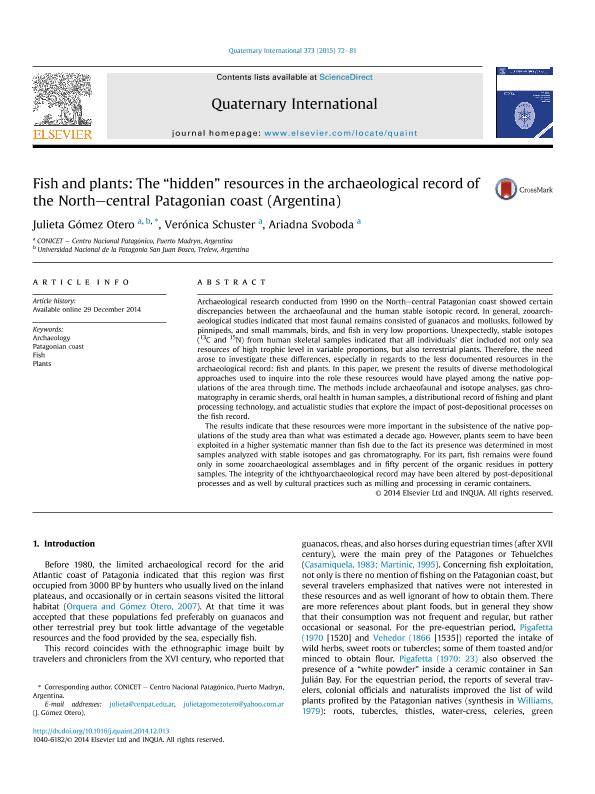Mostrar el registro sencillo del ítem
dc.contributor.author
Gomez Otero, Julieta

dc.contributor.author
Schuster, Veronica

dc.contributor.author
Svoboda, Ariadna

dc.date.available
2017-10-23T18:44:05Z
dc.date.issued
2014-12-29
dc.identifier.citation
Gomez Otero, Julieta; Schuster, Veronica; Svoboda, Ariadna; Fish and plants: The “hidden” resources in the archaeological record of the North-central Patagonian coast (Argentina); Elsevier; Quaternary International; 373; 29-12-2014; 72-81
dc.identifier.issn
1040-6182
dc.identifier.uri
http://hdl.handle.net/11336/26923
dc.description.abstract
Archaeological research conducted from 1990 on the North-central Patagonian coast showed certain discrepancies between the archaeofaunal and the human stable isotopic record. In general, zooarchaeological studies indicated that most faunal remains consisted of guanacos and mollusks, followed by pinnipeds, and small mammals, birds, and fish in very low proportions. Unexpectedly, stable isotopes (13C and 15N) from human skeletal samples indicated that all individuals' diet included not only sea resources of high trophic level in variable proportions, but also terrestrial plants. Therefore, the need arose to investigate these differences, especially in regards to the less documented resources in the archaeological record: fish and plants. In this paper, we present the results of diverse methodological approaches used to inquire into the role these resources would have played among the native populations of the area through time. The methods include archaeofaunal and isotope analyses, gas chromatography in ceramic sherds, oral health in human samples, a distributional record of fishing and plant processing technology, and actualistic studies that explore the impact of post-depositional processes on the fish record. The results indicate that these resources were more important in the subsistence of the native populations of the study area than what was estimated a decade ago. However, plants seem to have been exploited in a higher systematic manner than fish due to the fact its presence was determined in most samples analyzed with stable isotopes and gas chromatography. For its part, fish remains were found only in some zooarchaeological assemblages and in fifty percent of the organic residues in pottery samples. The integrity of the ichthyoarchaeological record may have been altered by post-depositional processes and as well by cultural practices such as milling and processing in ceramic containers.
dc.format
application/pdf
dc.language.iso
eng
dc.publisher
Elsevier

dc.rights
info:eu-repo/semantics/openAccess
dc.rights.uri
https://creativecommons.org/licenses/by-nc-nd/2.5/ar/
dc.subject
Archaeology
dc.subject
Patagonian Coast
dc.subject
Fish
dc.subject
Plants
dc.subject.classification
Arqueología

dc.subject.classification
Historia y Arqueología

dc.subject.classification
HUMANIDADES

dc.title
Fish and plants: The “hidden” resources in the archaeological record of the North-central Patagonian coast (Argentina)
dc.type
info:eu-repo/semantics/article
dc.type
info:ar-repo/semantics/artículo
dc.type
info:eu-repo/semantics/publishedVersion
dc.date.updated
2017-07-27T12:33:28Z
dc.journal.volume
373
dc.journal.pagination
72-81
dc.journal.pais
Países Bajos

dc.journal.ciudad
Amsterdam
dc.description.fil
Fil: Gomez Otero, Julieta. Consejo Nacional de Investigaciones Científicas y Técnicas. Centro Científico Tecnológico Conicet - Centro Nacional Patagónico; Argentina. Universidad Nacional de la Patagonia; Argentina
dc.description.fil
Fil: Schuster, Veronica. Consejo Nacional de Investigaciones Científicas y Técnicas. Centro Nacional Patagónico; Argentina
dc.description.fil
Fil: Svoboda, Ariadna. Consejo Nacional de Investigaciones Científicas y Técnicas. Centro Nacional Patagónico; Argentina
dc.journal.title
Quaternary International

dc.relation.alternativeid
info:eu-repo/semantics/altIdentifier/doi/http://dx.doi.org/10.1016/j.quaint.2014.12.013
dc.relation.alternativeid
info:eu-repo/semantics/altIdentifier/url/http://www.sciencedirect.com/science/article/pii/S1040618214009641
Archivos asociados
